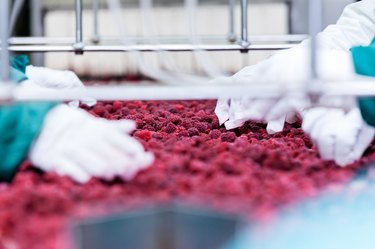
Astronauts in space and soldiers in combat use freeze-dried foods because they don't spoil, they weigh less and they're more convenient. But freeze-dried foods aren't necessarily quite as healthful as regular foods, with the levels of some nutrients reduced during processing. Although many nutritional benefits of freeze-dried foods remain intact, some of the more interesting aspects of freeze-dried foods such as berries may be their promise in helping fight disease.
Identification
Video of the Day
A primitive form of freeze drying was in use around 1250 BC by the Peruvian Incas as a way to preserve food. Machines to freeze dry foods and other products were developed during the two World Wars, and in 1938, the first freeze-dried coffee was produced. In planning for the long-duration Apollo missions, NASA developed freeze-drying techniques for other foods such as ice cream.
Video of the Day
Processing Effects
To freeze dry any food, it's first frozen solid, the water is removed, usually via a vacuum pump, and finally a heat source removes ice crystals. The finished product can retain up to 98 percent of its nutrition while weighing only 20 percent of the original. However, a study in Chile, published in 2011 in the "International Journal of Food Sciences and Nutrition," showed that the type of freeze drying used -- atmospheric freeze drying versus vacuum freeze drying -- and whether infrared radiation was added can affect nutrition in processed blueberries.
Nutritional Effects
Gary Stoner, Ph.D., and the American Institute for Cancer Research have found that the antioxidant phytochemicals found in fresh fruits is about the same as in their freeze-dried versions. However, both Stoner's research and the Chilean blueberry study found that ascorbic acid levels and the amount of polyphenol, a cell-protecting chemical in berries, were measurably reduced by freeze drying.
Additional Health Benefits
Stoner has used powdered freeze-dried berries in several studies, including one published in "Seminars in Cancer Biology" in October 2007, where the berries showed promise in both preventing and shrinking colon tumors. Stoner was also part of a study conducted by the University of Connecticut, published in 2011 in "Carcinogenesis," showing that freeze-dried black raspberry powder was effective in treating ulcerative colitis. Researchers in Oklahoma discovered freeze-dried strawberry powder improved total cholesterol and bad LDL-cholesterol levels in women with metabolic syndrome, a disorder that increases risks for coronary artery disease, stroke and type 2 diabetes. Their results were published in 2009 in "Nutrition Journal."
Concerns
Scientists at the Indian Institute of Technology in New Delhi looked at the effects of freeze drying on proteins. They noticed changes to the structures of proteins during the process that can lead to their inactivation. The research, published in the April 2004 issue of "Biotechnology and Applied Biochemistry," was geared toward the proteins in medical products such as human insulin and the immune-system molecule interleukin-2. The results have yet to be studied in freeze-dried food proteins.
- NASA Office of the Chief Technologist: Space Food
- Lyophilization Technology: Freeze Drying Milestones
- Freezedry Specialties Inc.: Vacuum Freeze-Drying Recovery & Restoration
- “International Journal of Food Sciences and Nutrition”; Effect of Operating Conditions in Freeze-drying on the Nutritional Properties of Blueberries; Alejandro Reyes et al.; May 2011
- American Institute for Cancer Research; Freeze-Dried Fruits Are a Good Health Choice?; May 2006
- “Carcinogenesis”; Anti-inflammatory Effects of Freeze-dried Raspberry Powder; DC Montrose; 2011
- “Seminars in Cancer Biology”; Cancer Prevention with Freeze-dried Berries; Gary Stoner; 2007
- “Nutrition Journal”; Freeze-dried Strawberry Powder Improves Lipid; Arpita Basu; 2009